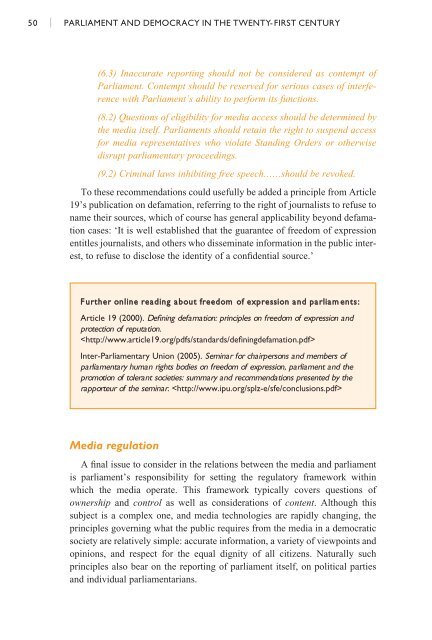PARLIAMENT AND DEMOCRACY - Inter-Parliamentary Union
PARLIAMENT AND DEMOCRACY - Inter-Parliamentary Union
PARLIAMENT AND DEMOCRACY - Inter-Parliamentary Union
You also want an ePaper? Increase the reach of your titles
YUMPU automatically turns print PDFs into web optimized ePapers that Google loves.
50 I <strong>PARLIAMENT</strong> <strong>AND</strong> <strong>DEMOCRACY</strong> IN THE TWENTY-FIRST CENTURY<br />
(6.3) Inaccurate reporting should not be considered as contempt of<br />
Parliament. Contempt should be reserved for serious cases of interference<br />
with Parliament’s ability to perform its functions.<br />
(8.2) Questions of eligibility for media access should be determined by<br />
the media itself. Parliaments should retain the right to suspend access<br />
for media representatives who violate Standing Orders or otherwise<br />
disrupt parliamentary proceedings.<br />
(9.2) Criminal laws inhibiting free speech……should be revoked.<br />
To these recommendations could usefully be added a principle from Article<br />
19’s publication on defamation, referring to the right of journalists to refuse to<br />
name their sources, which of course has general applicability beyond defamation<br />
cases: ‘It is well established that the guarantee of freedom of expression<br />
entitles journalists, and others who disseminate information in the public interest,<br />
to refuse to disclose the identity of a confidential source.’<br />
Further online reading about freedom of expression and parliam ents:<br />
Article 19 (2000). Defining defamation: principles on freedom of expression and<br />
protection of reputation.<br />
<br />
<strong>Inter</strong>-<strong>Parliamentary</strong> <strong>Union</strong> (2005). Seminar for chairpersons and members of<br />
parliamentary human rights bodies on freedom of expression, parliament and the<br />
promotion of tolerant societies: summary and recommendations presented by the<br />
rapporteur of the seminar. <br />
Media regulation<br />
A final issue to consider in the relations between the media and parliament<br />
is parliament’s responsibility for setting the regulatory framework within<br />
which the media operate. This framework typically covers questions of<br />
ownership and control as well as considerations of content. Although this<br />
subject is a complex one, and media technologies are rapidly changing, the<br />
principles governing what the public requires from the media in a democratic<br />
society are relatively simple: accurate information, a variety of viewpoints and<br />
opinions, and respect for the equal dignity of all citizens. Naturally such<br />
principles also bear on the reporting of parliament itself, on political parties<br />
and individual parliamentarians.

















